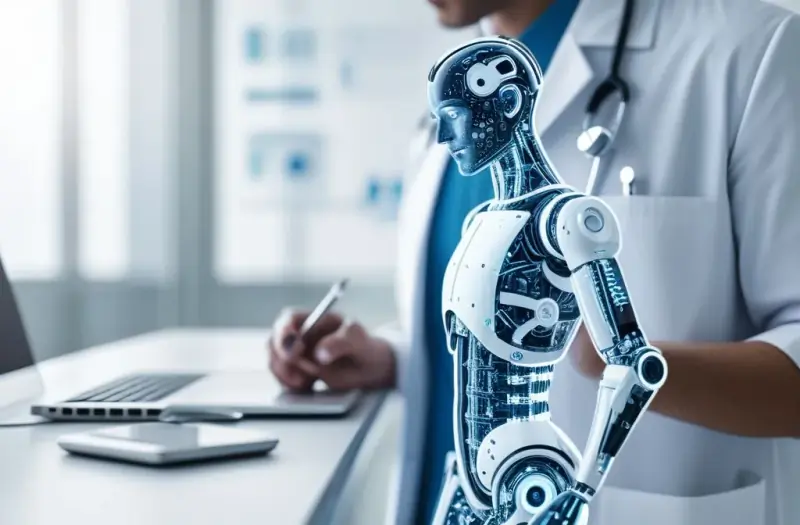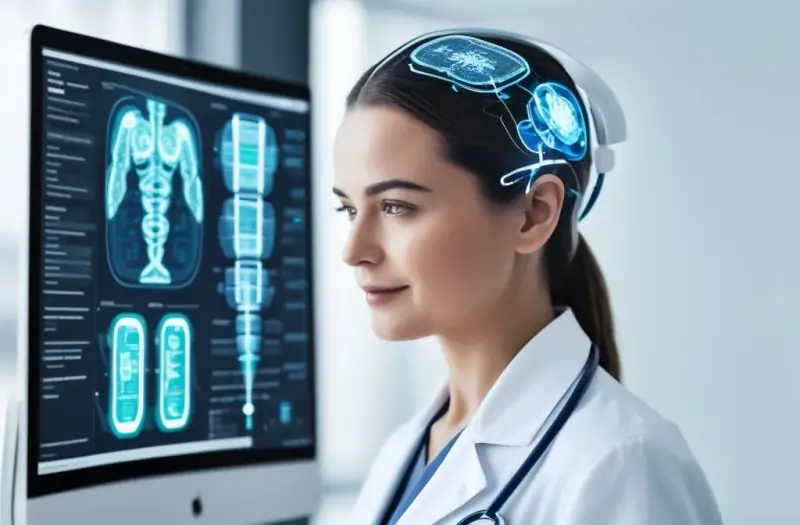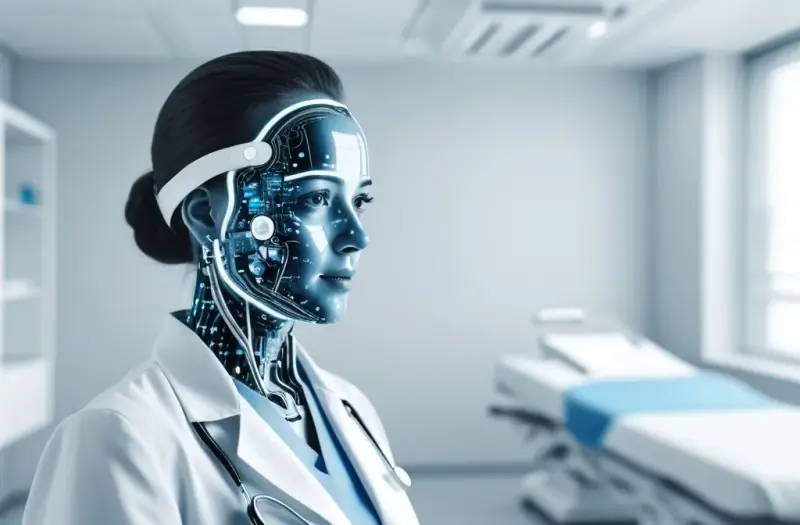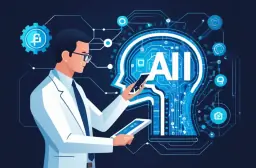AI in Healthcare: Revolutionizing Patient Care

Table of Contents
Artificial Intelligence (AI) is transforming industries around the world, and healthcare is no exception. As we explore the dynamic landscape of healthcare AI, it’s clear that the potential benefits are vast. From predictive analytics to personalized treatments, AI is changing the way we understand and deliver medical care. In this article, we’ll dive into how AI is revolutionizing healthcare, its applications, and the benefits it offers to both patients and healthcare providers.
The Rise of AI in Healthcare
AI in healthcare is rapidly evolving, offering innovative solutions to some of the industry’s most pressing challenges. AI for healthcare leverages advanced algorithms, machine learning, and data analytics to drive more efficient, accurate, and personalized care. This technology isn’t just futuristic—it’s already being implemented in hospitals, clinics, and research labs worldwide.
As we embrace this AI revolution, we must also consider its long-term potential. AI-driven healthcare innovations are creating a system that can analyze vast amounts of health data, provide accurate diagnostics, and support clinical decisions, ultimately leading to better outcomes for patients.
How AI Supports Healthcare Automation
Healthcare is a field rife with repetitive tasks, from administrative work to patient data entry. AI has the power to automate many of these tasks, freeing up time for healthcare professionals to focus on patient care. AI-powered healthcare systems can automate:
- Patient scheduling and management
- Billing and claims processing
- Electronic health records (EHRs) management
By automating these tasks, healthcare facilities can reduce human error, improve efficiency, and reduce costs. Additionally, intelligent healthcare systems can predict patient outcomes, schedule follow-up appointments, and ensure that clinical staff have all the information they need in real-time.
AI-Driven Patient Care: Enhancing Diagnosis and Treatment

One of the most significant areas where AI is making a difference is in AI-driven patient care. Machine learning algorithms have the ability to process vast amounts of patient data to identify patterns and provide more accurate diagnoses.
In the past, diagnostic accuracy was heavily reliant on the skill and experience of medical professionals. Now, with AI in medical imaging, healthcare providers can rely on algorithms trained to detect minute abnormalities in medical images such as X-rays, CT scans, and MRIs. These AI-powered medical systems offer faster, more accurate diagnostics, which can be crucial in life-saving situations.
Additionally, predictive healthcare AI can anticipate patient needs before they arise. By analyzing historical health data, AI can predict potential health issues and provide AI-enhanced healthcare services tailored to each patient’s unique medical history.
AI in Clinical Decision Support: Aiding Medical Professionals
Healthcare professionals are constantly under pressure to make fast, accurate decisions, often with limited information. AI for clinical decision support is a game-changer in this area. By integrating AI into decision-making processes, healthcare professionals can access data-driven insights that allow for more informed, timely decisions.
AI for clinical diagnostics is another area where technology plays a vital role. Healthcare machine learning algorithms can sift through years of medical data to provide evidence-based recommendations. This not only supports AI-powered healthcare innovations but also ensures that medical professionals are making decisions grounded in the latest research and patient-specific data.
AI in Medical Research: Accelerating Discoveries
The world of AI in medical research is accelerating the development of new drugs, treatments, and medical technologies. AI can analyze massive datasets much faster than humans, making it possible to identify new drug candidates, track disease outbreaks, and develop personalized therapies more efficiently than ever before.
For instance, AI in digital health research is being used to model the effects of new treatments on specific patient populations. Machine learning models allow researchers to simulate clinical trials, helping to reduce the time and cost associated with bringing new treatments to market.
AI for Health Data Analysis: Unlocking the Power of Information

Data is the lifeblood of modern healthcare, but without the right tools, its potential remains untapped. This is where AI for health data analysis comes into play. AI can analyze vast amounts of structured and unstructured data, uncovering insights that were previously hidden in medical records, clinical trials, and research papers.
With AI, healthcare providers can predict trends, identify at-risk populations, and personalize treatment plans. AI in medical artificial intelligence systems helps make sense of the deluge of health information, turning it into actionable insights that improve patient outcomes and reduce costs.
Challenges and Ethical Considerations of AI in Healthcare
While the benefits of AI in healthcare are immense, it’s important to consider the ethical challenges and potential risks. Patient privacy and data security are major concerns, especially with the vast amounts of personal health information being processed by AI systems. We must ensure that AI-powered medical systems comply with stringent data protection regulations to safeguard patient information.
Moreover, there’s the question of transparency in AI decision-making. It’s crucial for AI systems to be transparent and accountable, ensuring that healthcare professionals understand how decisions are made and can validate the recommendations provided by AI algorithms.
Ethical AI in Healthcare
To navigate these ethical challenges, AI in healthcare must be developed with a focus on:
- Data privacy and security
- Bias mitigation to avoid inequities in healthcare delivery
- Transparency in AI decision-making processes
By addressing these issues, we can build AI-powered healthcare systems that are both effective and ethical.
FAQs
How is AI transforming healthcare?
AI is transforming healthcare by improving diagnostics, streamlining administrative processes, and providing personalized treatment plans through data analysis and machine learning.
Can AI replace doctors in healthcare?
No, AI is not designed to replace doctors but to support them by providing data-driven insights that enhance decision-making and patient care.
What are the ethical concerns of AI in healthcare?
Ethical concerns include patient privacy, data security, and the transparency of AI decision-making processes.
How is AI used in medical imaging?
AI is used in medical imaging to analyze X-rays, CT scans, and MRIs, identifying abnormalities with greater speed and accuracy than traditional methods.
What are the benefits of AI in healthcare?
The benefits of AI in healthcare include improved diagnostic accuracy, personalized treatments, healthcare automation, and more efficient clinical decision-making.
Conclusion
AI is revolutionizing the healthcare industry by providing innovative solutions that improve patient care, streamline administrative tasks, and accelerate medical research. From AI-driven patient care to predictive healthcare AI, this technology is helping to make healthcare more efficient, accurate, and personalized.
As we move forward, it’s essential to continue addressing the ethical challenges that come with these advancements. By focusing on transparency, accountability, and patient privacy, we can ensure that AI delivers on its promise to revolutionize healthcare.
Key Takeaways
- AI is transforming healthcare by improving diagnostics, treatment, and administrative efficiency.
- AI-driven healthcare innovations are already being implemented to enhance patient care.
- Machine learning in healthcare supports clinical decision-making by providing data-driven insights.
- Ethical concerns, such as privacy and transparency, must be addressed as AI continues to evolve in the medical field.
- The future of healthcare AI holds the potential for more personalized, efficient, and accurate medical care.
Popular Tags
ADS SPACE HERE


